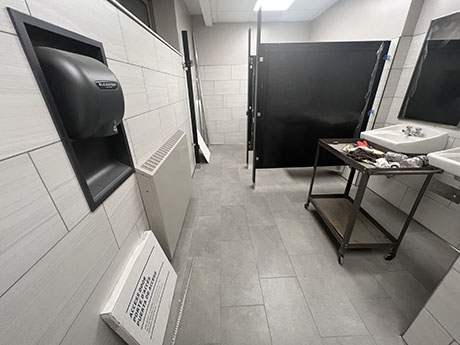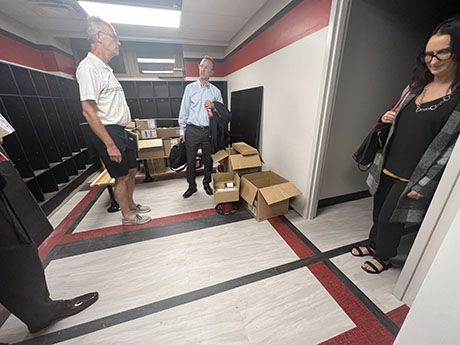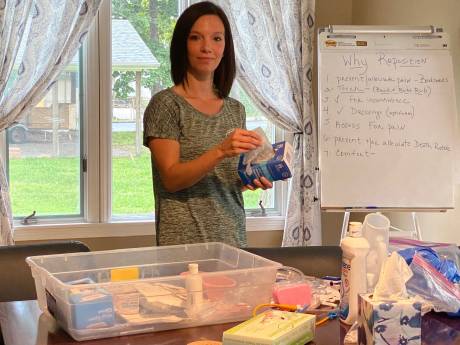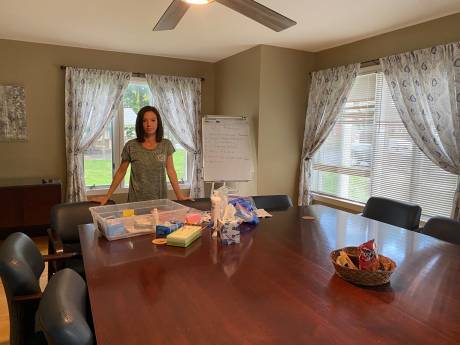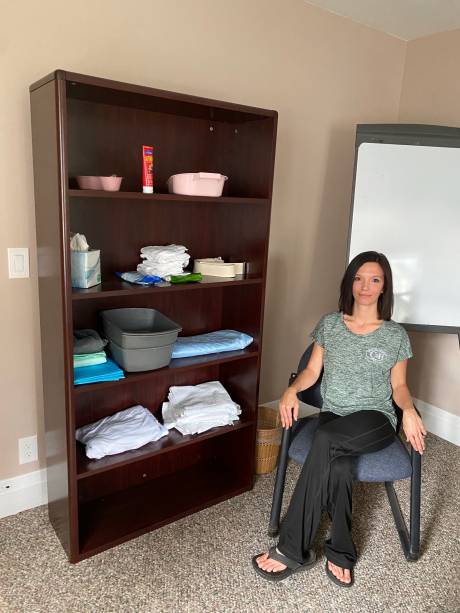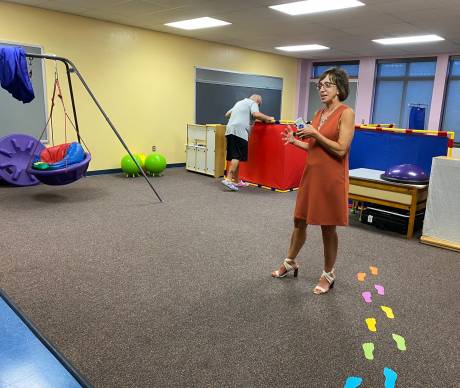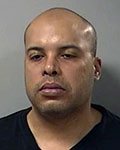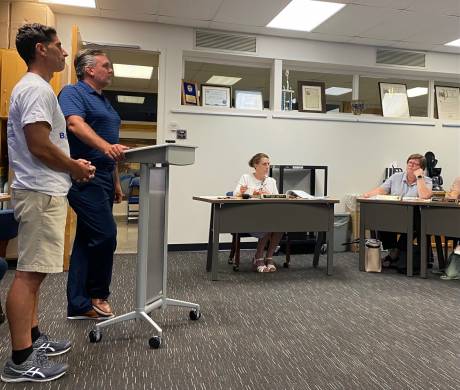“My name is Jarett LoCicero and you can find me at the GCASA recovery center, helping out with services for those looking to be themselves, feel better and maybe even live their dreams.”
That’s the way LoCicero, a Batavia resident in his fourth year of recovery, ended his six-minute talk this afternoon at the annual Overdose Awareness Day hosted by the GOW Opioid Task Force at Austin Park. He was able to pack a powerful message into his speech -- reflecting the event’s theme of reducing the stigma attached to addiction and letting people know that help is right around the corner.
Now a case manager at The Recovery Station operated by Genesee/Orleans Council on Alcoholism and Substance Abuse, LoCicero (photo above) shared that changing the perception of himself was key to his road to recovery.
“Today, we're speaking vaguely from a person's point of view that's been afflicted with the disease of addiction, and their capacity to change that perspective,” he said. “Ultimately, what stops the person from this change? And, maybe when someone is scratching at the fronts of their eyes to see themselves follow through with the decision, a change or a commitment, they fall short again, and again, ultimately not feeling as if they could succeed despite the best and most pure of intentions?”
He talked about the agony felt by the person caught up in substance use and for their families. As a result, he said, that person “can die for this or die for change, a desire to feel different -- the very nature of an overdose or instant gratification, and why many of us have gathered here today.”
Upon realization that someone has a problem, LoCicero said it then becomes a matter of perspective – and the change in that perspective can be accelerated by the encouragement from those who care.
“Once perspective may be supported by ‘I’ statements, such as I am, I can't, I won't, I come from this, I'm cut from that cloth, this is my culture, stay in your lane. This will never happen or workout for me,” he said. “But, despite all of that, a person will say to themselves if I just had X, Y and Z, I could do this. If the light could just shine down on me. I could do this and make a difference in my life.
LOVE AND SUPPORT ARE VITAL
“Because it's my life. What X, Y and Z boil down to being mostly in every case is our common and essential needs -- love and care support, personal needs that allow one the opportunity to self-actualize and become their dream.”
LoCicero said that once he saw his life through a different filter – “and put in some effort” – his perspective changed and his life changed “nearly instantly.”
He said his breakthrough to believing in himself has led to a desire to help others do the same thing.
“It’s what we can do for folks, (show that) we care about suffering with the disease of addiction, a disease of a lifestyle, and we can contribute to optimal conditions necessary for growth and opportunity by making folks aware of our want and commitment to help, most importantly, proving to them that it's possible,” he said.
LoCicero said those in attendance representing human services and health agencies want nothing more but to reach out to those struggling with addiction and “have you join the community – your community – or at least to reduce your potential for harm.”
In closing, he shared a three-step approach that pulled him out of bondage.
“If you can put yourself in front of God, you will find a miracle. If you work hard enough and grind hard enough, you may find your cure. If you be yourself, that's the only way you can find change and find happiness. If you do all three of these things, and if you ask for help, undoubtedly you will recover.”
PETTIT: PREVENTING DEATHS ARE A PRIORITY
Paul Pettit, public health director for Genesee and Orleans counties, (in photo above), applauded the work of the GOW Opioid Task Force, the three-county partnership of agencies that has been is place for the past five years.
“Preventing opioid overdose deaths … is one of the priority goals of the GOW Community Health Improvement Plan,” Pettit said, mentioning that drug overdose is the leading cause of injury mortality in the United States. “The opioid epidemic is an urgent and serious public health and public safety issue.”
Nationally, more than 100,000 people died of drug overdoses last year, and worldwide, the number approached 600,000. And, after trending down in 2018 and 2019, the numbers are increasing once again, he said.
“In Genesee County, there were 15 fatal opioid overdoses in 2020 – 15 too many,” Pettit said, “with six in Orleans County and seven in Wyoming County.”
He cited the rise in fentanyl and synthetic opioids and in concurrent stimulant use, especially cocaine.
“The takeaway from this is that people are dying of fentanyl overdoses when they only mean to take cocaine or another stimulant, and might not know they are at risk of an overdose at all,” he said.
BENNETT: OPEN ACCESS TO TREATMENT
GCASA Executive Director John Bennett shared that the Overdose Awareness Day initiative, which was started in Australia in 2001, now is celebrated internationally, with 367 events in the U.S. and around 600 outside of America’s borders.
“It’s an honor for us to be able to present this to our community,” he said. “As I go to the different booths here today, I am hearing people having good conversations with community members. It’s all about reducing the stigma of people with addiction. It's about giving people who've lost loved ones a place to talk about-- without stigma, without shame and without guilt -- in a really kind, positive and friendly zone.”
Bennett pointed the agency’s recently-opened Detox Center on East Main Street as a place “that is already saving lives.”
“We offer open access; you can just walk in and we’ll see you. Just last Thursday, I think we have seven admissions,” he said. “Doing events like this in the community brings awareness. So, my advice is if you need help, there's open access centers all around Western New York. Go to one of them, and they'll get you where you need to be. Or call me. My number is 585-815-1850 and I'll find you a place.”
Other speakers were Christopher Budzinack, a residential counselor at GCASA’s Atwater Community Residence, who spoke about his recovery from addiction and jail time, and Niki Lang, who read a letter and poem written by her son, Jason, who died in 2017 due to substance use disorder.
More than a dozen agencies had booths at the event, including Mental Health Association of Genesee and Orleans counties, Genesee County Office for the Aging, Batavia Community Schools, Genesee County Mental Health, Genesee Justice, National Council on Alcoholism & Drug Dependence, Job Corps, Rochester Regional Health, CORE, Restore, Genesee County Health Department, Oak Orchard Health, Suicide Prevention Coalition, Care-A-Van Ministries, Horizon, Fidelis Care, Molina Healthcare and WNY Heroes (for veterans).
Disclosure: Mike Pettinella is the publicist for GCASA.
The Rev. Vern Saile, pastor of Northgate Free Methodist Church, giving the invocation at Overdose Awareness Day.
"The Groove" belts out covers of classic rock songs -- from left, Joe Gagne, Pete Gomez, Neil Gagne and Bob Smith.
Messages of hope form the pieces of the puzzle at the National Council on Alcoholism & Drug Dependence. Erin Egloff, left, and Kaitlyn Mellina provide services in the Finger Lakes region.
Melody McMaster brightens up the day for 8-year-old Avi at the face painting booth.
The team from Rochester Regional Health (parent of United Memorial Medical Center) is ready to share with the public.
Animal attraction in the form of Frega's Funny Farm of Stafford.
Photos by Mike Pettinella.

